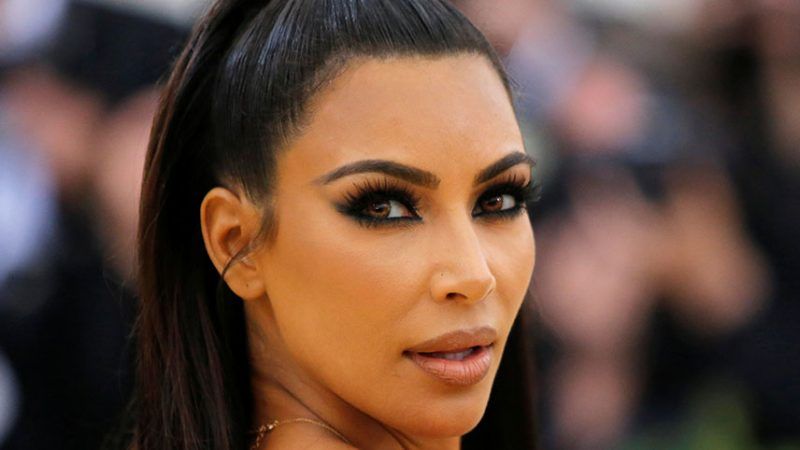Why Kim Kardashian's Favorite Hair Care Company Cancelled Its Line of CBD Products
Regulatory uncertainty is scaring some companies away from CBD products and forcing others to operate in a legal grey area.

Celebrity hairstylist Jen Atkin made some noise in the beauty world this month when she announced that her OUAI haircare brand would release a small batch of a CBD oil–infused scalp and body scrub. CBD—cannabidiol—is having a moment, and fans of Atkin, who counts the Kardashians among her celebrity clientele, reacted with enthusiasm.
But just a day before the product's scheduled launch on August 21, Atkin announced that plans for the CBD scrub had been shelved.
"We researched CBD months ago and saw it naturally calms inflammation and irritation. We decided to add it to a small special batch of our Scalp + Body Scrub," Atkin wrote on Instagram. "We've recently been told that as of a few weeks ago the FDA [Food and Drug Administration] has decided to change the rules and put a ban on CBD being used in 'food' products. Because body scrub is a topical product it apparently falls under the 'food' category."
CBD is a cannabis compound that can be derived from marijuana or hemp plants. Unlike tetrahydrocannabinol (THC), CBD won't get you high; it's almost impossible to overdose from taking too much of it. The compound has been hailed for its therapeutic benefits and has become a popular alternative for pain management. In January, the World Anti-Doping Agency removed CBD from its list of banned substances, and in June the FDA approved the first CBD drug for epilepsy. Consumers can buy thousands of CBD products—everything from oils to capsules to pet treats— from local retailers and online stores.
But because of the legal grey area around CBD, established beauty brands have largely stayed away from offering the compound in their products. Lord Jones, a natural skincare line that sells cannabis-infused body and face lotions, employs a team of lawyers to make sure its moisturizers don't run into problems with the DEA. In 2017, Target added CBD oil to its online store only to remove it from its website a few hours later. Walmart also removed a CBD dab product from its shelves with no explanation.
OUAI is more of an upstart, but its legal team still advised Atkin not to release the CBD product. "The lines are very blurry right now," she explains to Reason.
Though body scrubs like OUAI's generally qualify as cosmetics under FDA guidance regulations, states like California (where OUAI is based) have a much broader interpretation that could potentially qualify topical cosmetics like scrubs as food—particularly if they use food-grade ingredients in their formulations.
"Under FDA guidelines CBD is recognized as an active drug ingredient," says Alison Malsbury, an attorney with the Harris Bricken law firm. "Any beauty product that contains CBD needs to go through the FDA drug approval process." Even if manufacturers think they are staying within the law by not making medical claims on their labels, Malsbury says including CBD as an ingredient may be enough to trigger the FDA drug approval process. She also notes that CBD, like marijuana, is still a Schedule I controlled substance under federal law.
The confusion around CBD's legal status extends beyond the beauty industry. Even in California, where recreational marijuana sales became legal at the beginning of the year, CBD has become a target of state regulators.
In July, the California Department of Public Health (CDPH) issued a memorandum effectively banning hemp-derived CBD from all food products. CDPH's guidance echoed a June document posted by the FDA. Marijuana-derived CBD and edibles are exempted from the new CDPH rules as long as they are purchased from a state-licensed and regulated dispensary.
"You went from having CBD lattes on almost every corner to this sharp turn," says attorney Daniel Shortt, who also works at Harris Bricken and contributes to the firm's Canna Law blog. "It caught some in the CBD industry by surprise."
Shortt points out that like the FDA, the CDPH does not have an enforcement arm, which means that implementation of the no-CBD-in-food rule is left to local health agencies. The Orange County Register recently reported that health officials visited the Coffee Dose café in Costa Mesa—which offers CBD as an optional beverage add-on—and impounded its CBD supply; they threatened the owners with a fine if they resumed sales of the product.
The U.S. Hemp Roundtable, a trade coalition representing dozens of hemp companies, criticized the CDPH memo in a letter, accusing the agency of making "inaccurate statements about the legal status" of CBD products. The group contends that the 2014 Farm Bill, which partially legalized hemp by allowing states to set up pilot programs for research purposes, gives the crop legal protection under federal law. They're pushing Congress to pass the 2018 Farm Bill, which would legalize all hemp crops across the country.
"The federal farm bill should clear some of this up," says Kenny Morrison, president of the California Cannabis Manufacturers Association.
With hemp's legal status in question, some states have passed measures to clarify the laws around hemp-derived CBD products. Colorado and Indiana legalized various hemp products this year. And Michigan voters will decide in November whether they want they state to legalize marijuana and industrial hemp.
For many entrepreneurs, change can't come fast enough. According to the Brightfield Group, sales of CBD hit nearly half a million dollars in 2017 and will surpass the billion-dollar threshold around 2020.
Atkin still hopes to bring OUAI's CBD scrub to market in the future. "All I can say is call your local senators if you want to see any changes happening anytime soon," she wrote on Instagram to her 2.5 million followers. "Don't forget to vote in Nov and #FREETHESCRUB!"


Show Comments (7)